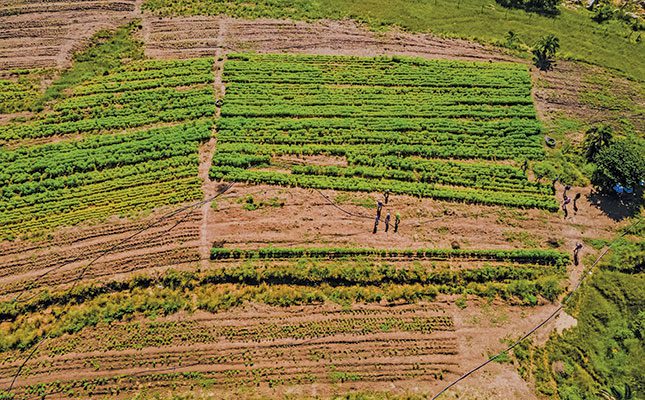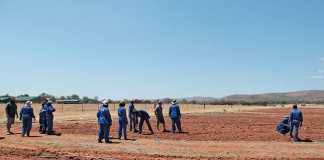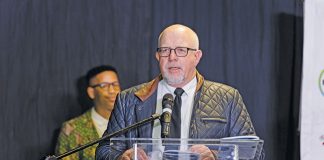
Photo: Supplied
Started as a small food security programme 14 years ago, Siyavuna has grown to provide livelihoods for thousands on the KwaZulu-Natal (KZN) South Coast.
Siyavuna means ‘harvest’ in isiZulu, and the Siyavuna Abalimi Development Programme was first piloted by the Give a Child a Family initiative, a registered child protection organisation promoting the rights and well-being of children and families.
The Timeline
The programme started in 2008 to help ensure food security for those within the care of Give a Child a Family, with 86 farmers on board helping provide access to fresh produce markets.
By 2009 an additional 628 farmers had been taken on board and vegetable sales had expanded to four communities. This signalled the birth of the Kumnandi brand, now a household name on the KZN South Coast.
The year 2010 saw Siyavuna hosting 1 130 active farmers who were operational in nine different communities.
Owing to its great success, Siyavuna moved on from the pilot stage and became a fully fledged agricultural business with its own membership. In 2011, it was registered as a non-profit organisation of more than 1 200 active farmers.
With more than 2 000 farmers trained in food production by 2014 and the development of farmers’ associations, Siyavuna was offering in-field mentorship and conducting inspections regularly, providing 2 000 families with access to nutritious food.
In 2015, it conducted an organisational assessment that resulted in developing agri-hubs, with three agri-hubs registered.
The progress continued with the development of value chains and three business plans: the Bulbine Frutescens Plan, implemented in 2021, and the Dried Vegetable and Youth Activation in Agriculture plans, implemented last year.
Since its inception, Siyavuna has expanded its reach to various areas within the agriculture sector, focusing on farming, education and training, expanding value chains, youth empowerment and strengthening the agricultural ecosystem.
Despite the addition of various limbs, including agri-hubs and co-operatives, the cornerstone of Siyavuna’s mission is food security for all. This is done through education, upskilling, training and outreach, following the principle, “If you give a man a fish, he will eat for a day; if you teach a man to fish, he will eat for a lifetime.”
In addition to the seeds, seedlings and fresh vegetables produced by the farmers of Siyavuna, the organisation has also branched out into the production of amaranth and Bulbine frutescens – a succulent plant that produces a gel extract used in the cosmetics industry – and dried vegetables, including paprika.
Siyavuna creates localised opportunities for communities to become more self-reliant and less dependent on ad hoc aid and programme funding. Its approach includes opportunities for individuals at all stages, from seed to sales.
An able leader
At the helm of Siyavuna Abalimi Development Centre is executive director Oxolo Mofokeng. Described as the organisation’s “slayer of doubts”, Mofokeng has had a seven-year journey of progress and growth at Siyavuna, where she started as a personal assistant.
Her passion for community development is just part of her leadership skills.
Mofokeng’s determination to propel Siyavuna forward has been rewarded with the achievement of the SAB Foundation Social Innovation Award 2021. She was also recognised by the Mail & Guardian in 2022 as one of South Africa’s 200 Young South Africans for her contribution to youth empowerment on the KZN South Coast.
By fundraising and strategic planning, while working closely with the board of directors, Siyavuna is the seed and Mofokeng brings the rain. She oversees all operational aspects of the organisation, from seed to harvest, from harvest to sale.
Speaking to Farmer’s Weekly, Mofokeng recounted the arduous yet promising journey of Siyavuna. The establishment of the programme, Mofokeng explained, came from Give a Child a Family launching the initiative as a means to support the families of the children in their care as well as enable them to make an income by selling their excess produce to their communities.
“In most cases, lack of income, lack of resources and the fact that there’s no food
security in the household [contributed to the problems]. They started the initiative of teaching those families how to grow their own vegetables for them to consume and then sell to their neighbours.
“The other aspect that they added that would enable the families to earn income was for the Siyavuna programme within Give a Child a Family to buy the produce they couldn’t consume and sell, provided it was still of good quality, regardless of the quantity, and it was sold in the urban markets, such as the hospitality industry and restaurants.”
She said that in the communities, people not involved with Give a Child a Family showed much interest when the project started, and this prompted the expansion to include anyone who was interested.
“By the end of 2013, the programme was operating in 12 communities. The one thing that attracted everyone was that they were able to sell their produce to Siyavuna, so they had a guaranteed market. This became one of the challenges we had to manage because we’d collect produce to the value of R35 000 but only 46% to 51% of that was sold. This meant the remaining percentage was written off and used to make our compost. But you don’t get the same return from compost as you do from fresh vegetables!”
At that stage, they had Siyavuna as an organisation, then their brand Kumnandi, which is better known, as that is how their vehicles are branded, and Siyavuna the brand.
“We operate in two municipal areas: Mdoni Municipality and Ray Nkonyeni Municipality. We separated these areas, with people from each municipality belonging to their own co-ops. We had two co-operatives within Siyavuna, which were managed by a board. But we realised that farmers weren’t really interested in the co-ops. They didn’t connect with them; they just wanted to be part of Siyavuna.
“In 2014, we carried out intensive strategic planning, where we had all the stakeholders, funders such as Wesbank, Natal Portland Cement, the Industrial Development Corporation [IDC], the board, farmers, where we discussed how to sustain the model.”
It was then decided to create agri-hubs, a community group that would manage their own finances, the produce grown, the pricing and the markets.
“Only three of the 12 communities showed interest. These received support from the IDC with infrastructure and financial support. They are still operational and the other nine are still selling to Siyavuna, and that is how we are still structured today.”
Interestingly, the agri-hubs started competing with Siyavuna. “Our farmers know our customers, so they started selling to them. They were happy to buy directly from the farmers because it was more fulfilling, as they know their stories.”
According to Mofokeng, they learnt a valuable lesson when their chairperson pointed out:
“If your beneficiaries don’t challenge you, then you’ve failed. If your beneficiaries start challenging you, then you’ve done your work.”
No chemicals
Siyavuna is making big strides towards ‘green farming’ and all the programmes aim for sustainable agriculture. Being environmental stewards requires SETA-accredited training, organic chemical-free food production, waterwise farming methods, and food processing that drastically reduces food waste.
“It’s worth the effort because organic farming sustains the ecosystem, improves production, and also increases nutrition in food – so critical in South Africa, where malnutrition is prevalent.”
Describing their methods, Mofokeng says that Siyavuna does not use chemicals.
“We practise permaculture farming and agroecology, and are part of the PGS SA group [which supports participatory guarantee systems]. We don’t use chemicals, we do our own inspections and peer-to-peer monitoring. We also have annual visits and an annual PGS day where we have customers, other PGS members from all over South Africa and our farmers, and we do spot checks in the farmers’ gardens to check if they are adhering to our standards. This also allows customers to see where their produce is grown and who they are supporting, so the connection makes it more realistic and the people who buy from us understand the value of the project.”
In the event that they find farmers using chemicals, they are suspended for two years.
“If they want to come back after that, we start afresh with training and assist them to rebuild and make sure the chemicals have been washed away. There’s a lot we do before we take them back.”
Challenges and opportunities
The IDC assisted Siyavuna with funding to undertake a value-chain feasibility study, which took 18 months and was completed a day before lockdown. The outcome was two business plans and one business case.
“The first was to grow Bulbine frutescens, which is used in the cosmetic industry, and which we supply to a company in Limpopo, Botanica Natural Products. We have a three-year off-take agreement that ends this year. Through that business plan, we applied to the SAB Foundation Social Innovation Fund and were winners in 2021.”
In 2022, through the Presidential Stimulus Fund Social Employment Fund, they began employing 1 000 youth to start their own gardens.
“We train them (we have SETA-accredited training), we mentor them and they also have a guaranteed market where they sell their produce to us. We sourced people who were interested in signing supply agreements with us, so now we have the AGT Foods contract to grow paprika, which we dry.”
Siyavuna has a deal with Umoya Foods to supply it with dried amaranth leaves. It also has a vegetable drying facility, equipped with a drying machine so that produce can be dried and milled to powder or flakes, depending on what form is required.
During the first year of the COVID-19 pandemic, Siyavuna lost 12 farmers to the virus and struggled to retain funding due to the economic downturn brought on by the lockdown.
“After COVID-19, banks were the biggest investors available and we were funded by the Nedbank Foundation. For six to eight months, we were on short time or getting paid only a percentage of our salaries.”
After the lockdowns, the demand changed vastly. “Our biggest customers were in Durban – ‘haute cuisine’ shops in Umhlanga, Durban North and Kloof bought their produce from us.
But because of [the COVID-19 lockdown], most of them closed, which meant that we lost some of our biggest customers. Only this month we heard that some of them are opening again.”
The flooding in July 2021 also posed huge problems. “Our 5ha Bulbine site was flooded and the roads were damaged. Even if we don’t lose crops when it rains heavily, all the inputs are washed away. Buying Ecocert organic inputs is not child’s play. After each heavy rainfall season, we have to buy inputs, everything from scratch.”
Speaking about where Siyavuna is now, Mofokeng said: “Over the past 14 years, we have invested in development, evaluation, research and realignment, always in close consultation with our farmers and key stakeholders. The next couple of years will see us focusing further on entrenching our farmers in sustainable agri-ventures, expanding our value chains and strengthening the agricultural ecosystem.”
Phone 039 312 0543, or email [email protected].










